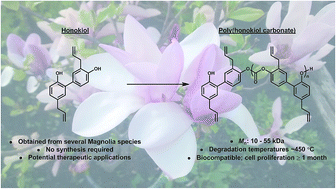Bio-based polycarbonates derived from the neolignan honokiol†
Abstract
Honokiol, a highly functional phenolic- and alkenyl-containing neolignan natural product isolated from several Magnolia plant species, is an interesting bio-based resource, which is shown to be useful directly as a monomer for the rapid and scalable synthesis of poly(honokiol carbonate) (PHC). PHC was synthesized in one step from the natural product using condensation polymerization methods. Polymers of number average molecular weight (Mn) ranging from 10–55 kDa were obtained on gram scales in yields up to 80%. Thermal analysis demonstrated high thermal stability, with degradation temperatures in excess of ca. 450 °C. Mechanical testing of several PHC polymers indicated a generally increasing storage modulus with increasing Mn and a similar trend with Tg. With an interest toward cardiovascular applications, initial cytotoxicity and fluorescence cell imaging studies were conducted and showed no cytotoxicity toward coronary venular endothelial cells (CVECs), which proliferated on PHC thin films up to a month. Bulk PHC is a robust material, as it underwent slow hydrolytic degradation under basic conditions (ca. 0.1% per day under 1 M NaOH(aq)), and no observable degradation under acidic and neutral conditions, each at 37 °C over 130 days. These polycarbonates serve as potential specialty engineering- or bio-materials derived from a commercially-available natural product monomer.


 Please wait while we load your content...
Please wait while we load your content...